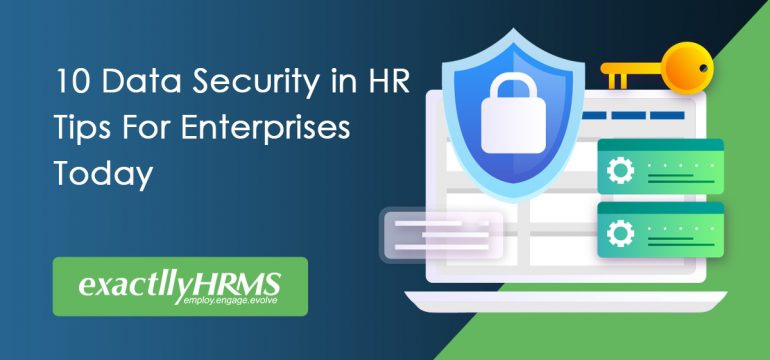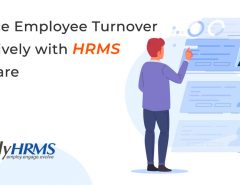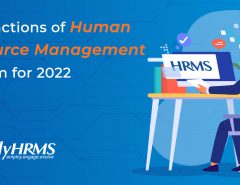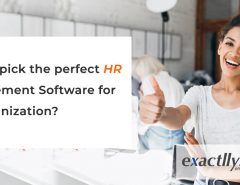With each passing day, data breaches are becoming a common occurrence. The previous decade witnessed the sweeping of sensitive data with digitalization. This resulted in attracting the notice of legislators & cybercriminals. Big organizations for business collect personal information of customers & employees. So these enterprises are the main mark for cyberattacks. The revenue of these organizations makes them come under the radar of several data protection regulations waves.
Enterprises now largely invest in various data protection tactics as they are encountering the issues of the data protection & compliance. However, they sometimes choose to emphasize just outer threats. These account for almost half of every kind of data breach. But 50% of the breaches also take place because of system glitches & human error.
Data security in HR can easily come under threat due to reasons like the email sent to the wrong address, misplacing USB in public places, employee negligence, etc. Securing data from both insides & outsiders is the need of the hour. How can enterprises execute that? Here are important tips that businesses must follow in 2021.
Data security in HR tips for 2021:
- Training employees – An employee joining a company might not at first understand the significance of data & its impact upon breaching. It is the duty of that company to make personnel understand the vitality of not just Data security in HR but the financial & reputational effects of data breaches. This is especially important for employees who handle sensitive data directly. They need to indulge in learning about the finest practices of data security. Also, they must know the steps required for avoiding a probable security occurrence.
While training employees, they must get to see scenarios that might take place in their various ongoing tasks. They must receive practical advice that they can apply after a training session ends. Here, the HR department of any enterprise has a huge role to play. The department must incorporate cybersecurity training as a critical portion of the induction procedure at the time of employee onboarding.
- Safeguarding mobile data – Within the premises of a company network, lays sensitive data of various kinds. So organizations sometimes only focus on those data & craft their data protection strategies. But the current times show a completely different scenario. The focus is now more on remote work due to pandemic outbreaks like COVID-19. Hence, the protection strategies need to incorporate policies that guarantee the protection of data that is kept on the company devices. Data security in HR in this way always stays protected irrespective of its location.
Human resources within an organization must work on strict BYOD or bring the policies of your own device for preventing the occurrence of any data breach. This is important as while remote working, individuals’ access data via their very own devices. The company’s network does not include any registration of those devices. These are the devices that generate a massive threat to the security of data. However, companies with the help of a robust HR department can handle such situations seamlessly with a highly functioning BYOD policy.
- Employing a data violation response plan – It is true that not a single data protection policy guarantees fail-safe fortification. Even the most all-inclusive strategies can only put off 96% of all data violations. The reason for this is the impulsiveness of security occurrences. Many things can take place within an organization. For instance, well-trained personnel can sometimes make careless mistakes, or the discovery of a hardware or software vulnerability can follow exploitation prior to its patching.
Managing data breaches becomes convenient when planned ahead. Here the HR department of a company can gain help from advanced HRMS software. Data security in HR technologies like this helps in creating response plans from before. Enterprises can test the plans for quickly learning what is causing the data violation. Employees can also then craft a way out from before for such emergencies. Efficient response plans can assist companies a lot in cutting down expenses.
- Implementing data auditing – Be it any big or small data protection strategy, carrying out data auditing is a must. This is the very foundation of a sound strategy. The reason for this is very much obvious. Prior to taking various approaches for protecting data, organizations must learn the kind of personal information they are collecting, where the data is stored & how the data will be used. Any company can easily identify vulnerabilities that are found in data flow by keeping a check on sensitive data. This will help businesses in making informed decisions while developing any Data security in HR protection strategies.
Businesses can also save money as they address the identified risks & implement solutions that are modified for the susceptibility data faces within their own network. However, in order to maintain all this, the HR section of a company must indulge in data monitoring with the help of high-quality human resource management software. This will help businesses in identifying poor data security approaches amidst employees.
- Recognize regulatory & compliance requisites – A powerful data protection policy does keep sensitive data highly secure for companies. But this also doesn’t mean that the policies are absolutely compliant with the data protection bylaws. There are manifold new regulations in the current times that provide new rights to data subjects in context to the data like the right to choose out of the sale of personal information.
Data auditing processes also sometimes display particular protection mechanisms that a company doesn’t need. The enterprise will actually require law for implementing those protection mechanisms irrespective of those being useful to the enterprise or not. Every organization must comprehend the compliance requisites that actually apply to their particular sector & country. Also, data protection tactics need to integrate compliance requirements perfectly.
Representatives from various business functions like HR and IT must work together to guarantee the ingraining of Data security in HR safekeeping policies in the company’s practices. Cooperation & compliance must commence in C-suite. The senior management department can receive influence from the HR department for understanding it is for everyone to follow the security procedures.
- Encouraging employees to step-up – In the occurrence of a data breach, employees who manage PII must receive encouragement for speaking up. They must find the courage and zeal to alert the appropriate staff about the matter. They must first have an employee attendance system. When this happens, resolving any emergency situation becomes convenient. The HR department not just encourages the working staff but also offers particular notices while information is breached.
- IT policy implementation for data security – The easiest way of combating the risks of data breaching is through data security practices implementation through utilizing the latest technologies. To do this, close association with an organization’s IT department is paramount for crafting IT policies that are cybersecurity based. This will largely help in keeping the data threats in control. Starting from data access, data copying to the personal devices of employees, and file-sharing; these policies cover everything. Also, such practices are even more applicable in the current times especially when the majority of people are working from their homes. HRMS software will also help in keeping everything in check including HR data privacy.
- Modifying the access to thin-skinned data – When it comes to ensuring Data security in HR of any company, the HR department is largely functional towards it. The HR department can restrict access to susceptible data for employees depending on job roles. This is also known as access control. This is a procedure that describes data that is highly sensitive to employees. Every company in the current times requires advanced HRMS software for implementing access control in a successful manner. This will largely decrease the occurrences of data thefts & various other HR data thefts.
- Keeping a check on equipment – At the time of employee onboarding, the HR department of a company needs to create a checklist. By this, they will carry a record of the equipment that every employee receives. After the working hour’s end, an executive from the HR section will check whether every employee has returned equipment or not. This attendance management system will save a business in several ways. This will ensure that they never walk out with susceptible information. Instead of manually, keeping a proper checklist in HRMS software is much more feasible. When it comes to security in HR, it should be the priority of an organization.
- People who are recruited – It is important to safeguard PII or personally identifiable information commences with properly selecting the candidates who will gather access to information that is sensitive. The candidates who are chosen for finance, payroll, and HR positions must be vetted precisely. HR data security needs to be ensured at all times.
Final Say:
Let us face it. Cyberattacks and data breaches can never occur just in a vacuum. There are manifold variables that work at each turn. This is applicable to both the target sides & attackers. This makes it highly vital to fight threats with a stable & ongoing campaign for making sure that businesses never get caught with their guard down. The above mentioned Data security in HR tips is extremely important. To ensure this, it is of utmost significance to utilize the best HRMS software from exactllyHRMS. Such software can prevent any data breach activity from occurring to a large extent. Contact us today. Free demo available easily.





Leave a Reply